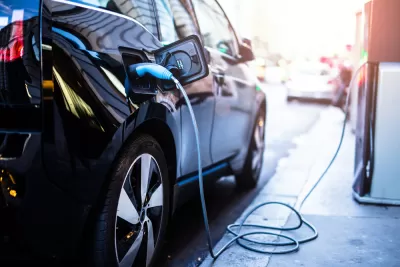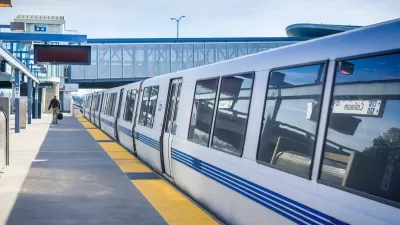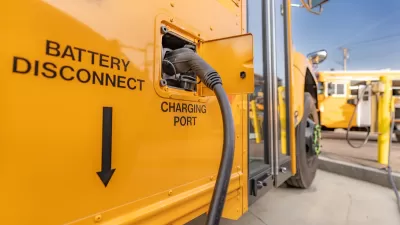A key question of the U.S. approach to greenhouse gas reductions is whether an already stressed electric grid will be able to handle a whole fleet of new electric vehicles.

Samantha Houston examines a key question in the wake of the Inflation Reduction Act’s focus on electric vehicles as a climate solution: Can the nation’s electric grid handle all the charging that will be necessary to keep the nation’s new fleet of electric vehicles running?
There are really two big questions in play, according to Houston: “Can the grid handle all of the electric vehicles (EVs) we have in the near term, like today and next year? And will the grid be able to handle all of the electric vehicles we will have as we progress toward a highly-electrified transportation future, by say 2040 or 2050?”
Electric grid woes have taken on a new political tenor in recent years, as heat waves and deep freezes have taxed energy grids around the country, sometimes with tragic results. Some critics worry that electric cars will add just another pressure on an already strained systems—reducing the resilience of energy systems and creating climate risks, rather than reducing them.
According to Houston, the grid is going to be just fine, in a direct rebuttal to the “fossil fuel disinformation machine.”
The grid is well-equipped to supply energy to EVs at current adoption levels. Over 2.7 million plug-in hybrid and full battery-electric cars and light trucks were sold in the United States by the end of 2021, with the majority of those still on the road. Sales of cars and light trucks in 2022 so far have been strong, with battery electric sales hitting a striking new record, and bus and heavy truck sales are expected to pick up as well. Even in states with higher EV adoption currently, power demand from EVs is not causing issues. For example, California has reach 16.3% light-duty EV sales (totaling 1.14 million EVs on the road), and while California has been struggling to maintain grid reliability the past few years, increased electricity demand from EV charging load is not one of the problems.
Upgrades will be necessary even in the short term, Houston admits, but there is enough capacity now to handle a wave of new electric cars. Even more upgrades and preparation will be necessary for the future, as well, but Houston offers a slate of recommendations for how to prepare for a future drive by electric vehicles.
FULL STORY: Can the Electric Grid Handle EV Charging?

Planetizen Federal Action Tracker
A weekly monitor of how Trump’s orders and actions are impacting planners and planning in America.

Maui's Vacation Rental Debate Turns Ugly
Verbal attacks, misinformation campaigns and fistfights plague a high-stakes debate to convert thousands of vacation rentals into long-term housing.

San Francisco Suspends Traffic Calming Amidst Record Deaths
Citing “a challenging fiscal landscape,” the city will cease the program on the heels of 42 traffic deaths, including 24 pedestrians.

Amtrak Rolls Out New Orleans to Alabama “Mardi Gras” Train
The new service will operate morning and evening departures between Mobile and New Orleans.

The Subversive Car-Free Guide to Trump's Great American Road Trip
Car-free ways to access Chicagoland’s best tourist attractions.

San Antonio and Austin are Fusing Into one Massive Megaregion
The region spanning the two central Texas cities is growing fast, posing challenges for local infrastructure and water supplies.
Urban Design for Planners 1: Software Tools
This six-course series explores essential urban design concepts using open source software and equips planners with the tools they need to participate fully in the urban design process.
Planning for Universal Design
Learn the tools for implementing Universal Design in planning regulations.
Heyer Gruel & Associates PA
JM Goldson LLC
Custer County Colorado
City of Camden Redevelopment Agency
City of Astoria
Transportation Research & Education Center (TREC) at Portland State University
Jefferson Parish Government
Camden Redevelopment Agency
City of Claremont





























